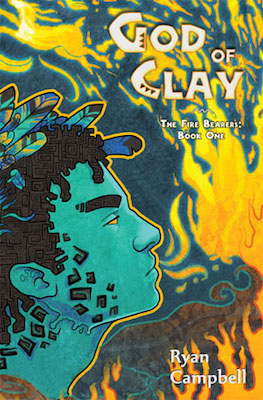God of Clay
By Ryan Campbell
Cover Art by Zhivago
259 pp., $17.95 (Kindle, $5.99)
Sofawolf Press, September 2013
With the release of Forest Gods, the second title in Ryan Campbell’s Fire Bearers trilogy, it seemed like a good time to catch up with the first book, God of Clay. I’m only sorry I left it so long, because I thoroughly enjoyed the read.
When the young god Doto discovers that the legendary and feared fire bearers are close by his forest home, he hopes the information will stir his father, Kwaee, to leave his temple and come exploring. Instead, Doto is commanded to bring one of the fire bearers to Kwaee.
Driven from their old home by drought, Clay’s tribe has settled next to a forest. Here, at last, they can rely on the rains, even if the forest itself is filled with dangers and forbidden to even the bravest hunters by King First Claw. Clay, unlike his brother Laughing Dog, has absolute faith in the gods of his people and the stories passed down by the Teller, but he never expected to be snatched from his village by a leopard-like god he’s never even heard of.
As the two get to know each other, both must reevaluate what they thought they knew—Clay about the gods of his people, Doto about the Fire Bearers. Doto comes to realise that the fire bearers are unlike anything he has encountered before, neither gods nor animals. Clay has to sift through the tales of his tribe, sorting truths from distortions and guesses.
Their journey through the forest brings them closer, but there is a time limit on their acquaintance: not only is Kwaee waiting for them at the end of the trip, with an implacable hatred of the fire bearers that Doto is now starting to question, but Clay is slowly succumbing to a wound Doto is forbidden by divine law to heal.
Doto and Clay are both fairly simple souls. Each has been brought up, Doto by Kwaee and Clay by the elders of his tribe, to believe that the world is a certain way, and they step beyond those boundaries with trepidation. Not so Laughing Dog, Clay’s brother.
Named for the hyena, which for Clay’s tribe may be a good or evil omen, Laughing Dog has his own opinions of the gods and he is unafraid to share them, even when a refusal to back down from his stance means banishment. He spends most of the book apart from his brother, yet his actions have already affected Clay’s own path, and there is no doubt that they will meet again as the trilogy continues.
It is obvious from the moment he appears that Laughing Dog is doomed, that his nemesis will catch up to his hubris. Yet the manner of his doom is startling and terrifying, and it is impossible not to feel sorry for him. Though he descends ever deeper into horror, he fights it all the way down.
There’s a timelessness about the setting; it could be far in the past, an alternate present, a future following the fall and rise of modern civilisation, or even another planet. Yet although the geography might not anchor the world of Clay and Doto in a recognisable place and time, Campbell’s prose grounds the reader firmly in the world.
Clay’s village is painted in such rich colours that I felt I knew exactly what it would be like to pass the fence and walk among the huts, while the desert Firelands are redolent of vastness, loneliness, hunger and thirst. There’s also a definite sense of the world beyond the horizons known to Clay’s people, just as the humans’ world is outside the experience of Doto.
The most loving descriptions, however, are saved for Doto’s forest. Here is an environment teeming with life, from tiny insects up to ancient trees. This has been Doto’s home from birth, and everything in it—flowers, fruit, vines—does the young god’s bidding. But as he starts to see things from Clay’s point of view, he begins to recognise the strangeness and the dangers.
Doto has grown up with powers far outside human experience, but is almost entirely ignorant of life beyond the forest, just as Clay is fearful of what lies within it and of the gods. And although Clay has grown up surrounded by family, he is just as lonely as Doto. God of Clay is largely a story about friendship across different cultures.
Not to say that there is no action or peril. Clay in particular is vulnerable in the depths of the forest, but there are dangers for Doto too, while Laughing Dog’s arc has him facing dangers both natural and supernatural. This first book reaches a satisfying conclusion, but I was left with a sense that there were greater adventures and a wider world yet to come. I can’t wait.
God of Clay and Forest Gods are both available from Sofawolf Press. God of Clay is also available as an ebook.

